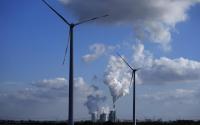20 September 2006Patricia Reaney
Greenland's massive ice sheet is melting much quicker than scientists had estimated and the pace has accelerated lately, according to research published on Wednesday.
An analysis of satellite observations shows the rate of ice loss rose 250 percent between the periods April 2002 to April 2004 and May 2004 to April 2006, most of it in southern Greenland.
The ice sheet is now shrinking by about 248 cubic kilometers each year which is equivalent to a rise in sea level around the world of 0.5 millimeters.
"There is an increase in mass loss and it is significant," said Isabella Velicogna, of the University of Colorado and NASA's Jet Propulsion Laboratory at the California Institute of Technology.
"Los Angeles County uses about one cubic kilometer a year, so it is a lot of water," she added in an interview.
The findings, based on data from the Gravity Recovery and Climate Experiment (GRACE) satellite, and published in Nature magazine, are consistent with earlier results showing increased melting due to rising temperatures blamed on global warming.
But Velicogna and her colleague John Wahr go a step further because their analysis is very recent, up to April 2006, and shows the accelerated rate of loss is almost entirely in southern Greenland.
"It was losing quite a bit of mass before 2004 but there is a very strong acceleration, which means things are changing," said Velicogna
"It is more than we have been observing in the last century," she added.
Scientists predict that global average temperatures will rise by between one and six degrees Celsius this century unless urgent action is taken now to cap and reduce carbon emissions.
A rise of three degrees could cause a large rise in sea levels, loss of species and increase famine and disease.
Greenland's ice sheet is so huge that if it melted entirely sea levels across the world would rise by about 7 meters (yards), Tavi Murray of the University of Wales in Swansea said in a commentary on the research.
Murray believes the GRACE results could help scientists re-evaluate the rates of loss that can be expected from global warming.
"Uncertainties remain, but the GRACE results provide one of the best estimates of overall mass balance of the ice sheet," he added.
http://news.yahoo.com/s/nm/20060920/sc_nm/environment_warming_dc_1






